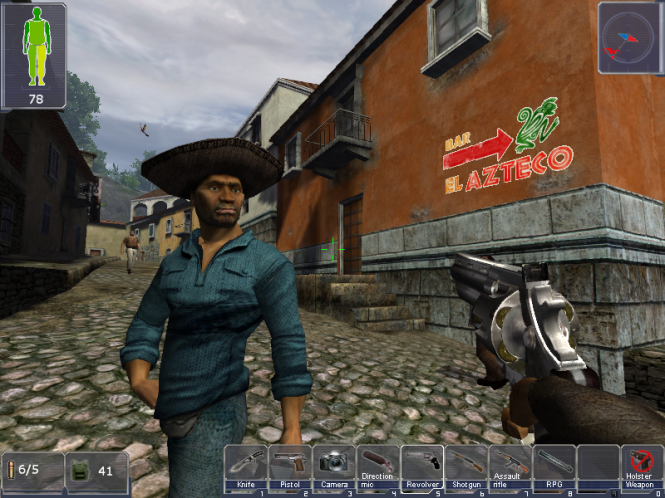In 2001, a small team at Ukrainian studio GSC Game World released Codename: Outbreak, a tactical FPS often pointed out as a predecessor to their 2007 hit STALKER: Shadow of Chernobyl. But there’s another story here: two of its developers, Sergey Zabaryanskiy and Roman Lut, left GSC to start Deep Shadows and create their own FPS/RPG hybrid: Xenus: Boiling Point.
Known as Boiling Point: Road to Hell in English, this ambitious game has a small studio punching way above its weight, trying to combine GTA, Far Cry and Deus Ex into an immersive open-world FPS/RPG.

The game stars Saul Meyers, a former French soldier that flies to Colombia in search of his missing daughter (the English translation changes the country to a fictional one, Realia). To advance his search he’ll constantly need to pay people for information and assistance, so you’ll spend most of the game doing side-quests to raise money in order to progress the story. As a mercenary, Saul can work for any of the factions clashing all over the country: the Colombian army, a communist guerrilla, a drug cartel, bandits, indigenous tribes, the CIA and the civilians.

While Boiling Point has a few stats that improve with use, there aren’t social skills or complex dialogs – its role-playing is based on how you deal with the factions. Joining the communists means cheap ammo and free medicine, but the better-equipped army soldiers will hunt you on helicopters! Killing soldiers improves your standing with the cartel, bandits and communists, but what will you do if the cartel asks you to steal guerrilla weapons for a lot of money?

All this happens in a large, seamless open world, that Saul can explore by car, boat, helicopter or plane. It’s mostly taken by featureless jungles, but also has towns, villas, markets and military bases, all with NPCs offering quests that range from fun gags to deadly battles to fetch quests. The difficulty spikes can be frustrating, but the fetch quests are the worst offenders, forcing you to drive for hours and hours across the jungle. This repetition, the eternal grind for cash and a buggy release gave Boiling Point a rather bad “eurojank” reputation.
Still, it was successful enough to warrant a sequel: Xenus II: White Gold (aka White Gold: War in Paradise) sends Saul back to Latin America to investigate cocaine packages that are killing their users. The seven factions are back, and the game is now set in a large archipelago, adding more guns, vehicles, a parachute and far more interesting environments, NPCs and quests.

The character system changed from improve-by-use to a perk system, also adding stealth, lock-picking and persuasion skills (with very limited utility), while the overall gameplay is more lighthearted and arcade-like, with faster movement and less punishing combat. While a more accessible game, White Gold still suffers from the constant grind for money and a general lack of polish – the English translation and voice acting are terrible, its initial release was buggy and it has an end-game difficulty spike that will stop most players.

To make matters worse, while its original release was in 2008, the English release came only in 2010, and only on the online store GamersGate – meaning most English-speaking players never even heard of it. An Xbox 360 port was also planned, but never released.
Even with all these setbacks, Deep Shadows’ ambition continued: while working on White Gold they were also doing The Precursors (2009), an epic two-part sci-fi RPG. Precursors is basically White Gold in space: its core gameplay and even UI are the same, but now there’s a full Space Sim in it – you can pilot a spaceship, mine asteroids, trade resources at space stations, fight pirates or raid cargo ships in order to raise money.

Despite this bold new addition, Precursors is the weakest of Deep Shadows’ games. It promises an entire galaxy, but there’s very little actual content or depth. There’s only six planets to explore – three being very tiny, the other three being barren and filled with repetitive fetch quests. The faction system was cut to just two sides per planet, and the combat is extremely frustrating thanks to poorly-implemented energy shields.

The writing also reaches its lowest point, mostly just teasing the player and ending in a huge cliffhanger, setting up a sequel that never came. Sadly, its failure ended Deep Shadows’ ambitious RPG dreams, forcing them to shift to casual hidden object games. Felipe Pepe

